Eight New Tenure-Track Faculty Members
Trinity welcomes eight new tenure-track faculty members this fall, and an alumnus is among the professors who bring a wide range of expertise and research interests to campus.
By Hamna Tariq ’20 and Andrew J. Concatelli
Trinity News, Aug. 20, 2018
Eight tenure-track faculty members began new appointments at Trinity College on July 1, bringing an array of academic expertise and research interests to campus. The eight individuals are: Arianne Bazilio, assistant professor of environmental science and chemistry; Clayton Byers, assistant professor of engineering; Hasan Cömert, assistant professor of economics; Julie C. Gamble, assistant professor of urban studies; Gabriel F. Hornung ’07, assistant professor of religious studies; Peter K. Kyle, Jr., assistant professor of theater and dance; Lina Ma, assistant professor of mathematics; and Gerardo Ruiz Sánchez, assistant professor of economics.
Dean of the Faculty and Vice President for Academic Affairs Tim Cresswell said, “Hiring new faculty is an important part of the annual cycle of academic life. Each year, we are excited to greet the new members of our faculty. We have a diverse and stimulating new group of scholar teachers this year, and I always hope that when a new colleague arrives on campus, they will remain at Trinity until the day they retire.” A full list of all the new faculty members joining Trinity College for the 2018-2019 academic year is available here.
Arianne Bazilio, Assistant Professor of Environmental Science and Chemistry
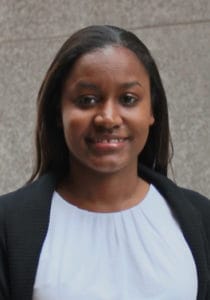 Arianne Bazilio believes in actively engaging students in hands-on exercises to broaden learning and show how principles actually work. “For example, with water quality measurement in ‘Methods in Environmental Science,’ there will be a lab activity or class demonstration illustrating one or two methods on improving water quality and how the quality is measured,” she said. Bazilio seeks to equip her students with the scientific knowledge and practical skills necessary to thoughtfully approach real-world issues. “I welcome the opportunity to be part of the Trinity community, which values independent thinking and a real-world education,” she said. “I am excited to continue teaching and mentoring students and aiding outreach initiatives to support and build diversity.”
Arianne Bazilio believes in actively engaging students in hands-on exercises to broaden learning and show how principles actually work. “For example, with water quality measurement in ‘Methods in Environmental Science,’ there will be a lab activity or class demonstration illustrating one or two methods on improving water quality and how the quality is measured,” she said. Bazilio seeks to equip her students with the scientific knowledge and practical skills necessary to thoughtfully approach real-world issues. “I welcome the opportunity to be part of the Trinity community, which values independent thinking and a real-world education,” she said. “I am excited to continue teaching and mentoring students and aiding outreach initiatives to support and build diversity.”
Bazilio received her B.S. in chemical and biological engineering from New York University and went on to earn an M.S. and Ph.D. in environmental engineering from the University of Massachusetts Amherst. Bazilio also served as a postdoctoral fellow at the University of Texas at San Antonio. Bazilio describes herself and her work as the products of an interdisciplinary education. “I highly value interdisciplinary approaches in both teaching and research, which is a tradition of Trinity College,” she said. “I see my appointment in the Environmental Science Program and the Chemistry Department as the best of both worlds.”
Bazilio specializes in aquatic chemistry, methods of chemical analysis in environmental science and engineering, physical and chemical processes for water and wastewater treatment, inorganic chemistry, and the fate of emerging contaminants in the aquatic environment. Her research applies physical and chemical principles to provide sustainable solutions for healthy aquatic environments and safe drinking water. This fall she will be teaching “Methods of Environmental Science” and “Intro Chemistry I.”
Clayton Byers, Assistant Professor of Engineering
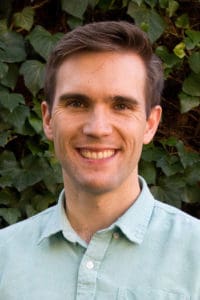 Clayton Byers received his B.S. in mechanical engineering from Washington State University, then spent four years in the U.S. Air Force as a program manager for the Space and Missile Systems Center before earning both his M.A. and Ph.D. in mechanical and aerospace engineering at Princeton University. “I credit my experience in the Air Force with instilling in me the discipline and motivation that have been essential in my personal and professional successes,” Byers said.
Clayton Byers received his B.S. in mechanical engineering from Washington State University, then spent four years in the U.S. Air Force as a program manager for the Space and Missile Systems Center before earning both his M.A. and Ph.D. in mechanical and aerospace engineering at Princeton University. “I credit my experience in the Air Force with instilling in me the discipline and motivation that have been essential in my personal and professional successes,” Byers said.
Byers—whose work focuses on fluid dynamics, turbulence, thermodynamics, differential equations, and novel measurement techniques—said that he has always enjoyed the personal interactions made possible by small class sizes. “Trinity seems like the perfect mix of small classrooms, technical instruction and laboratory work, and liberal arts involvement that mixes the technical with the societal and artistic aspects of life,” he said.
His experience in teaching includes introductory engineering concepts for high school students and advanced turbulence techniques for graduate students. “The most inspiring work I’ve done has been with motivated undergraduates,” said Byers. He has developed courses, lectures, and review sessions for classrooms of more than 100 students and conducted one-on-one sessions. By relating core concepts to everyday experiences, Byers said that he strives to provide an active learning environment that engages students in their process of learning. “If I inspire someone thanks to a fun and productive research collaboration, then I feel I’ve been a successful advocate for the sciences,” he said.
Byers will be teaching “Mechanics I (Statics)” and “Thermodynamics” this fall.
Hasan Cömert, Assistant Professor of Economics
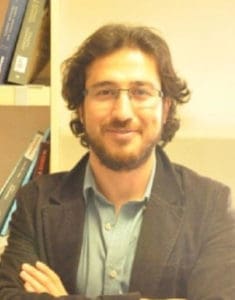 Hasan Cömert received his Ph.D. in economics from the University of Massachusetts Amherst after earning a B.S. and M.S. in economics from Middle East Technical University in Turkey. Cömert specializes in subjects including international economics, world economy, and comparative central banking. “It is very important for students to develop skills to understand existing interdependencies in the global community in order to be able to contribute to national and global peace and prosperity,” Cömert said. Among his research interests are macroeconomics, financial economics, international finance, emerging markets, and the Turkish economy.
Hasan Cömert received his Ph.D. in economics from the University of Massachusetts Amherst after earning a B.S. and M.S. in economics from Middle East Technical University in Turkey. Cömert specializes in subjects including international economics, world economy, and comparative central banking. “It is very important for students to develop skills to understand existing interdependencies in the global community in order to be able to contribute to national and global peace and prosperity,” Cömert said. Among his research interests are macroeconomics, financial economics, international finance, emerging markets, and the Turkish economy.
Cömert is the author of Central Banks and Financial Markets: The Declining Power of US Monetary Policy and the co-author (with Rex McKenzie) of The Global South after the Crisis. He also has published several articles in Turkish and in English at peer-reviewed journals including Cambridge Journal of Economics and has contributed as a researcher to different working packages of FESSUD and FEUTURE, European Union-funded projects conducted by consortiums of many universities.
Cömert said he wanted to join the faculty at Trinity in part because of the strong reputation of its Economics Department. “I want to contribute to the students and broader community as much as possible,” said Cömert. “I am also looking forward to working in a place where I can collaborate with and learn from colleagues from both the Economics Department and other departments.”
Cömert will teach “Central Banking and Financial Markets” and “Money and Banking” at Trinity this fall.
Julie C. Gamble, Assistant Professor of Urban Studies
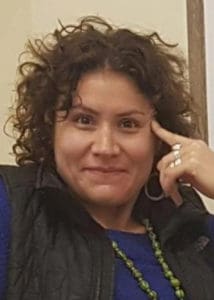 Julie C. Gamble is an urbanist, feminist, and Latin American scholar who has taught at Universidad San Francisco de Quito, Ecuador, where she still holds an affiliated position. Gamble earned a Ph.D. and master’s in city and regional planning (M.C.P.) from the University of California, Berkeley, and a B.A. in history and gender studies from Northwestern University.
Julie C. Gamble is an urbanist, feminist, and Latin American scholar who has taught at Universidad San Francisco de Quito, Ecuador, where she still holds an affiliated position. Gamble earned a Ph.D. and master’s in city and regional planning (M.C.P.) from the University of California, Berkeley, and a B.A. in history and gender studies from Northwestern University.
Gamble’s work draws from multiple methods to study urban environments, paying special attention to how people and objects help create cities. Her research is engaged with transit infrastructure, social justice, and gendered politics in Latin American cities, and her areas of specialty also include urban infrastructure, global urbanism, sustainable urban development, and urban bicycling. Gamble said that her pedagogy is informed by feminist and social justice readings that aim to empower students to actively participate in both small seminars and large lectures.
“I am excited to teach undergraduates eager to learn about cities, which is another reason I was attracted to Trinity for its urban location, but global focus,” Gamble said. “The Urban Studies Program is unique in the regard.” She added that she is looking forward to working with the Liberal Arts Action Lab and other community development opportunities at Trinity.
Gamble will be teaching “Introduction to Urban Studies” and “From Hartford to World Cities” this fall. She said she plans to invite local community members to speak in her “Hartford to World Cities” course. “I aim to bring the city of Hartford into both of my courses through direct student engagement with the city itself,” said Gamble.
Gabriel F. Hornung ’07, Assistant Professor of Religious Studies
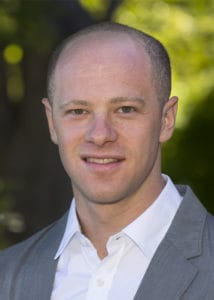 Gabriel F. Hornung ’07 began studying the diverse religious traditions of Judaism and Hinduism as a religion major here at Trinity College, where he earned his B.A. His graduate work at Yale University led him to focus specifically on biblical studies, and he completed his Ph.D. in Hebrew Bible at Harvard University. Hornung has also studied extensively in Germany and Israel, focusing his research on the theological developments in the biblical and Second Temple periods.
Gabriel F. Hornung ’07 began studying the diverse religious traditions of Judaism and Hinduism as a religion major here at Trinity College, where he earned his B.A. His graduate work at Yale University led him to focus specifically on biblical studies, and he completed his Ph.D. in Hebrew Bible at Harvard University. Hornung has also studied extensively in Germany and Israel, focusing his research on the theological developments in the biblical and Second Temple periods.
As a Trinity alumnus, Hornung said that he values the relationships he had with Trinity’s faculty. “My interest in the study of religion stemmed in large part due to the guidance and mentorship my professors offered,” Hornung said. He believes in faculty leadership that encourages engagement with the theoretical difficulties inherent to the academic study of religion. He added that his decision to return to Trinity—where he has been a faculty member since 2016—was motivated by the “collegiality of the Religious Studies Department.”
Hornung said that he has bonded with his students at Trinity over the years, including during a trip with the Humanities Gateway Program when he and a colleague took students to New York City’s Metropolitan Museum of Art Museum. He said, “In particular I remember meeting a number of students on the rooftop gallery, where we enjoyed the beautiful view and chatted about a whole host of topics.”
Hornung specializes in the Hebrew Bible, and his interests extend into the New Testament, ancient Judaism, and early Christianity. In the fall, he will be teaching “Biblical Tradition” and “Introduction to the Hebrew Bible” at Trinity.
Peter Kyle, Assistant Professor of Theater and Dance
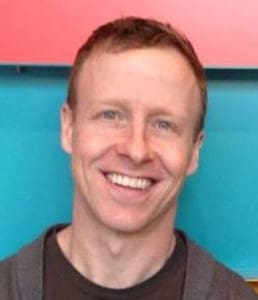 Peter Kyle is a dancer, choreographer, filmmaker, and the artistic director of Peter Kyle Dance. He has toured internationally as a soloist with Nikolais and Murray Louis Dance and performed with the companies of Mark Morris, Erick Hawkins, Gina Gibney, Laura Glenn, and the theater company P3/east. After receiving a B.A. in dance and German area studies from Kenyon College and an M.F.A. in dance from the University of Washington, Kyle has taught at Bard College, Marymount Manhattan College, Sarah Lawrence College, the University of Washington, and Cornish College of the Arts, among other institutions.
Peter Kyle is a dancer, choreographer, filmmaker, and the artistic director of Peter Kyle Dance. He has toured internationally as a soloist with Nikolais and Murray Louis Dance and performed with the companies of Mark Morris, Erick Hawkins, Gina Gibney, Laura Glenn, and the theater company P3/east. After receiving a B.A. in dance and German area studies from Kenyon College and an M.F.A. in dance from the University of Washington, Kyle has taught at Bard College, Marymount Manhattan College, Sarah Lawrence College, the University of Washington, and Cornish College of the Arts, among other institutions.
Kyle has received choreographic commissions and residencies across the U.S., in Scotland, Norway, Germany, Cyprus, Mexico, China, and Ukraine. He also is associate director at Bearnstow, an arts retreat in Maine, and serves on the Board of Directors at Triskelion Arts in Brooklyn, New York.
This summer, Kyle has been working on the final phase of a yearlong research and performance collaboration in Ukraine called Dancing Through Translation, which grew out of his work with linguistics students during his 2016 Fulbright Specialist grant in Kiev, and he plans to continue his interdisciplinary work at Trinity. He said, “Trinity’s history and emphasis on excellence, grounded in a liberal arts experience, celebrates the possibility of making rich, unexpected connections across fields of study.”
This fall, Kyle will teach “Improvisation as Composition,” in which students develop the skills to use improvisation as a choreographic tool. He will also build a new performance project with Trinity students that will be a part of the Fall Dance Concert.
Lina Ma, Assistant Professor of Mathematics
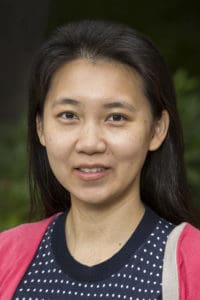 Lina Ma holds a Ph.D. in applied mathematics and an M.S. in financial mathematics from Purdue University, where her research topics focused on scientific computing and numerical analysis. She received a B.S. at Beijing University, China, specializing in scientific and engineering computing.
Lina Ma holds a Ph.D. in applied mathematics and an M.S. in financial mathematics from Purdue University, where her research topics focused on scientific computing and numerical analysis. She received a B.S. at Beijing University, China, specializing in scientific and engineering computing.
Ma came to Trinity in 2017 as a visiting assistant professor after working for three years as a research associate at Penn State University, where she expanded her research areas in applied math. “Coming from big public universities, I appreciate Trinity’s liberal arts setting, where you can really get to know the students and establish relations with them,” Ma said. “I am also very fond of the small class size that makes delivering knowledge more efficient.”
Ma said that she enjoys teaching mathematics and encourages active student involvement both inside and outside the classroom. She believes that the training process of understanding the problem, learning necessary skills, trying to solve the problem, and presenting ideas is great preparation for future careers in all disciplines. This summer, Ma worked with two Trinity students on a research project related to what they learned during a finance course the previous semester. “Students are very hard-working and are extremely dedicated to the project,” Ma said.
Her research interests include developing faithful computational models and efficient algorithms for problems arising from many areas in applied sciences, including fluid dynamics, math-biology, electro-magnetic models, and stochastic models. Ma will teach “Calculus I” and “Math of Finance” at Trinity in the fall.
Gerardo Ruiz Sánchez, Assistant Professor of Economics
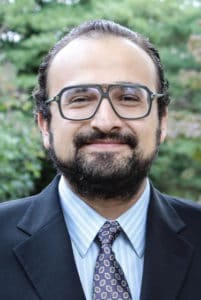 Gerardo Ruiz Sánchez said that his primary aim at Trinity is to give students the tools they need to see the relevance of economics to their lives and to public policy. “Public policy decisions affect the welfare of many people,” Ruiz Sánchez said. “It is important that students learn the tools to evaluate the impact and consequences of these public policy decisions. Economics offers a way of thinking about them.” He also wants to improve students’ ability to read, write, and think about economic problems using the material taught in class.
Gerardo Ruiz Sánchez said that his primary aim at Trinity is to give students the tools they need to see the relevance of economics to their lives and to public policy. “Public policy decisions affect the welfare of many people,” Ruiz Sánchez said. “It is important that students learn the tools to evaluate the impact and consequences of these public policy decisions. Economics offers a way of thinking about them.” He also wants to improve students’ ability to read, write, and think about economic problems using the material taught in class.
Ruiz Sánchez graduated from Yale University with a Ph.D. in economics in 2018. Prior to that, he spent almost three years working for a private consulting firm. He received a master’s degree in economic theory and a B.S. in applied mathematics and economics at Instituto Tecnológico Autónomo de México (ITAM). His teaching philosophy has been shaped both by his teaching experience at Yale and by his experience doing research in empirical applied microeconomics. “I like Trinity’s emphasis on teaching and mentoring students. I am looking forward to working with students who want to major in economics,” Ruiz Sánchez said.
His research interests include the areas of industrial organization, health economics, applied microeconomics, and econometrics. In the fall semester, Ruiz Sánchez will be teaching “Intermediate Microeconomics” and “Economics of Health & Health Care” at Trinity.
